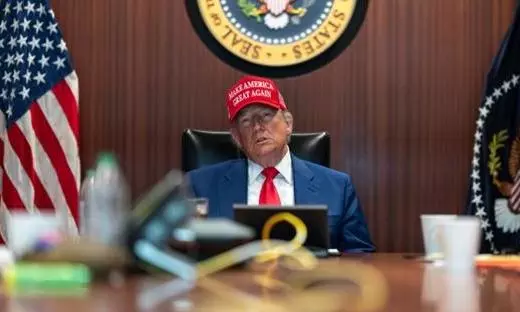
- Home
- India
- World
- Premium
- THE FEDERAL SPECIAL
- Analysis
- States
- Perspective
- Videos
- Sports
- Education
- Entertainment
- Elections
- Features
- Health
- Business
- Series
- In memoriam: Sheikh Mujibur Rahman
- Bishnoi's Men
- NEET TANGLE
- Economy Series
- Earth Day
- Kashmir’s Frozen Turbulence
- India@75
- The legend of Ramjanmabhoomi
- Liberalisation@30
- How to tame a dragon
- Celebrating biodiversity
- Farm Matters
- 50 days of solitude
- Bringing Migrants Home
- Budget 2020
- Jharkhand Votes
- The Federal Investigates
- The Federal Impact
- Vanishing Sand
- Gandhi @ 150
- Andhra Today
- Field report
- Operation Gulmarg
- Pandemic @1 Mn in India
- The Federal Year-End
- The Zero Year
- Science
- Brand studio
- Newsletter
- Elections 2024
- Events
- Home
- IndiaIndia
- World
- Analysis
- StatesStates
- PerspectivePerspective
- VideosVideos
- Sports
- Education
- Entertainment
- ElectionsElections
- Features
- Health
- BusinessBusiness
- Premium
- Loading...
Premium - Events

With the United States intervening in the Israel-Iran conflict so brazenly, all bets are off on what happens next
Rather than a “spectacular success”, as Donald Trump called it, the US bombing of three of Iran’s nuclear sites appears more like a spectacular failure of his foreign policy.
That the strikes should happen hardly a day after Pakistan proposed Trump’s name for the Nobel Prize for Peace is the ultimate irony. For, Trump’s action has now taken the world to a new dangerous level of destabilisation which could potentially be catastrophic for the Middle-East and the rest of the world.
New jolt
The beleaguered region is still recovering from the world-altering consequences of the US’s invasion of Iraq in 2003, only to experience the latest jolt.
After complicating whatever chances there was of peace between Ukraine and Russia, Trump has made it difficult for Iran to opt for the diplomatic option. In the last few weeks, the US president had all but threatened Iran into negotiating in a manner that would favour Israel and the United States.
Also read: Israel-Iran conflict LIVE | Iran asks for emergency meeting of UNSC over US strikes
Iran, a big power in the region, was clear it wouldn’t compromise on its sovereignty. With this proviso it engaged with the US. But Trump, as the world witnessed in the humiliating manner he treated Ukraine’s President Volodymyr Zelenskyy, approached Iran’s leader Ayatollah Ali Khamenei in the same manner.
Also read: Netanyahu hails Trump’s ‘bold decision’ to hit Iran’s nuclear sites
Obviously, Iran resisted and the talks went into the sixth round. Before negotiations could begin, Israel attacked Iran.
Incidentally, Ali Khamenei is not just the Supreme Leader of Iran but one among the top three spiritual heads of the Muslim Shia sect and is highly revered in the community, akin to the Pope among Roman Catholics. For Ali Khameni to be openly criticised and targeted by Israel and Trump will not be taken lightly by his followers.
Trump's pro-Israel stand
The American voter, in the presidential elections last November, chose Trump over his Democratic opponent Kamala Harris, angered by the way the previous Joe Biden administration supported Benjamin Netanyahu government in its assault on Gaza.
Clearly, either the messaging was skewed or the Trump camp’s narrative misled a majority of outraged voters. For Biden is nowhere when compared to Trump’s love for Israel.
Trump’s affinity to Israel and its right-wing leadership is well documented. In his first term, the US president first moved the consulate from Tel Aviv to Jerusalem, a longstanding demand of Israel. He presented a peace proposal that gave nothing to Palestinians while affording all benefits to Israel. It was, not surprisingly, stillborn. No one took it seriously.
Among his most pro-Israel actions, the one on the 2015 nuclear deal with Iran took the cake. Signed when his predecessor Barack Obama was president, the nuclear agreement was ferociously opposed by Israel. In 2018, Trump obliged Israel by walking out of the agreement that had the US’s western European allies, Russia and the United Nations as co-signatories.
Also read: Iran's foreign ministry says US itself launched dangerous war against Iran
This issue was on top of Trump’s agenda when he assumed office as US president earlier this year. Five months to the date, almost, Trump has done what Netanyahu has been asking for – to bomb Iran’s nuclear facilities.
Unjustified attack
Though Trump indicated that the US would enter the conflict if Iran did not agree to sign a deal on his terms, there was still a sliver of doubt as he gave himself 15 days to think over it. For Trump to overrule himself and to have abruptly given the order to bomb Iran is shocking, to say the least.
The US’s entry cannot be justified under any circumstances. Iran, rather than being obdurate, has shown that it is willing to enter into genuine negotiations. It is a signatory to the Nuclear Non-Proliferation Treaty (NPT), it has always allowed United Nations and IAEA inspections of its facilities.
There have been reports that it is enriching uranium far in excess of its requirement for peaceful purposes, giving rise to doubts whether it is close to developing a nuclear bomb.
Days before Israel first bombed Iran’s nuclear facilities last week, an IAEA team said it had enriched uranium to the extent of 60 per cent. If it reached 90 per cent enrichment, that would make it possible for Iran to have a nuclear bomb. This was used by Israel as justification for its attack on Iran, and for Trump to ratchet up his demand for Tehran to sign an agreement.
But, later, the IAEA clarified that Iran was nowhere near making a nuclear bomb, and that it needed some elements of the technology which it did not possess now.
Also read: Nations call for diplomacy after US strikes on Iran
For Israel, the upcoming nuclear facilities in Iran has proved to be a source of angst. As in the past, when it attacked similar facilities in Iraq and Syria, Israel was itching to repeat it on Iran.
When US invaded Iraq
The conflict being limited to Iran and Israel still left some sliver of hope that it could be contained before it escalated. Iran was in the process of engaging with countries in Western Europe to bring about some kind of end to Israel’s missile attacks on its nuclear facilities.
But, with the US entering the conflict so brazenly, all bets are off on what happens next. In 2003, when the US invaded Iraq, the then George W Bush administration announced victory within days. However, this turned to be completely off the mark.
For the next eight years at least, US troops were stuck in Iraq. The invasion gave rise to the dreaded Islamic State, destabilised other governments in the region and had long-term consequences for the rest of the world. Bush initially called it “war on terror”, then moved the goalpost to “regime change” and then to “ushering in democracy”.
To this day, Iraq has not recovered from the invasion and is plagued by instability.
There were reports that the Bush administration would target Iran next. But the US desisted from doing that given the mess that the region was in already.
The Iraq invasion led to a wave of popular uprisings, which started off on a positive note for democracy, but eventually degenerated into mindless infighting among various groups, manipulated from the outside by the US and its Western allies.
Trump has once again poked the hornet’s nest, by bombing Iran’s nuclear facilities. It would require all the skills of Tehran’s Islamic government to ensure it doesn’t go out of control. Alternatively, Iran could view the US’s attack as an affront to its self-respect and sovereignty and counter-attack, unmindful of the consequences.
The world has surely moved several degrees to the edge of a steep cliff.


